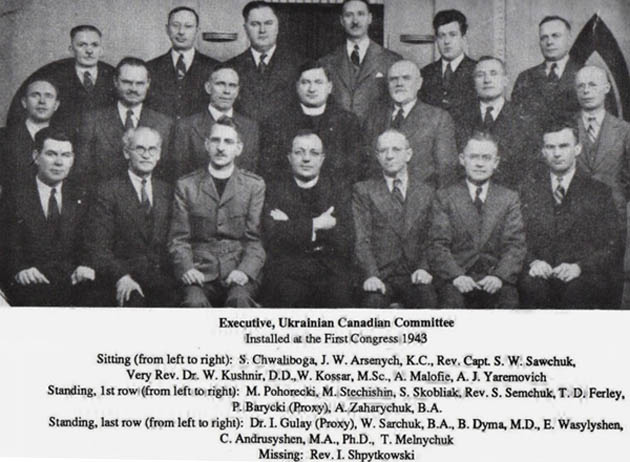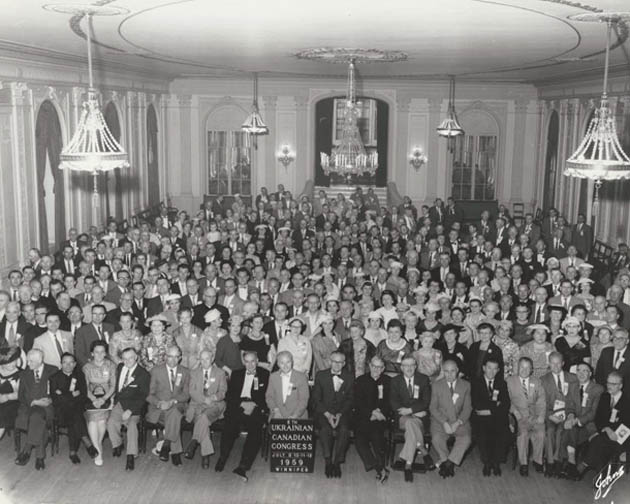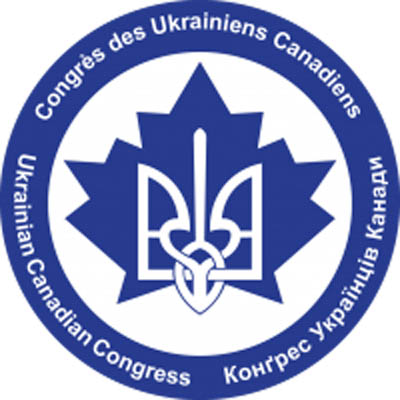Ukrainian Canadian Congress
Ukrainian Canadian Congress (Конґрес українців Канади; Kongres ukraintsiv Kanady, or КУК; KUK). An umbrella organization for the Ukrainian community of Canada. It was formed as the Ukrainian Canadian Committee on 6–7 November 1940 in Winnipeg by a merging of two rival umbrella organizations established earlier that year—the Ukrainian Central Council of Canada and the Representative Committee of Ukrainian Canadians—that included the five major Ukrainian associations in Canada: the Ukrainian Catholic Brotherhood of Canada (BUK), the United Hetman Organization, the Ukrainian Self-Reliance League (SUS), the Ukrainian National Federation (UNO), and the Ukrainian Workers’ League. As an ad hoc committee, KUK had the original purpose of uniting the Ukrainian community behind the Canadian war effort, and its establishment was fostered intensively by the Canadian government. The actual process of forming the group was aided in large measure by the intervention of Tracy Philipps, a British specialist on Near Eastern and Eastern European affairs.
KUK was successful in getting young Ukrainians to enlist in the armed forces and in promoting the purchase of war bonds. After the Second World War it continued its activities by responding to the plight of Ukrainian displaced persons and refugees in western Europe. It set up the Ukrainian Canadian Relief Fund and the Central Ukrainian Relief Bureau in London, thereby saving many refugees from forced repatriation to the Soviet Union, helping them materially, and resettling them in Canada. As the new immigrants set up their own organizations, KUK altered its constitution to admit them. By 1965 its membership increased to 30 organizations, although its structure and operations were effectively controlled by the so-called Big Six senior member groups—BUK, SUS, UNO, the Ukrainian Canadian Veterans’ Association, the Canadian League for the Liberation of Ukraine, and (later) the Ukrainian Canadian Professional and Business Federation (UCPBF).
KUK has promoted Ukrainian in public schools, universities, and in private schools run by Ukrainian organizations. Its recommendations on preserving the multicultural character of Canadian society helped shape government policy. In 1963 it set up the Ukrainian Canadian Foundation of Taras Shevchenko to support Ukrainian-Canadian cultural activities. It also played a major role in founding the World Congress of Free Ukrainians in 1967.
Since its inception KUK has had a strongly anticommunist character and has steadfastly refused to co-operate with the pro-Soviet Association of United Ukrainian Canadians. During the 1970s KUK came under increasing criticism from its own member groups, particularly the Ukrainian Canadian Students’ Union (SUSK) and the UCPBF, for its ‘undemocratic’ structure (manifested in the issue of veto power for each of the Big Six groups) and the actual ineffectiveness of its operations. Such concerns finally led to the establishment of KUK’s Ukrainian Community Development Committee (UCDC) in 1982 and the formation or revival of KUK provincial council structures in the four western provinces.
KUK has established its own Ukrainian Information Bureau in Ottawa (1987). It organized the celebrations of the millennium of the Christianization of Ukraine (1988) and the centenary of Ukrainian settlement in Canada (1991–2). It has sponsored a Civil Liberties Commission (from 1985) whose first and paramount task was to respond to indiscriminate charges of war criminals among Ukrainian Canadians. KUK also undertook the issue of redress for the internment in Canada during the First World War of unnaturalized Ukrainian migrant laborers from Austrian-ruled Western Ukraine.
Today KUK has over 30 member organizations and 35 local branches in six provinces. Work on the regional level is co-ordinated by five KUK provincial councils (British Columbia, Alberta, Saskatchewan, Manitoba, and Ontario). The head office in Winnipeg is run by an executive director, a position filled by V. Kokhan (1948–66), S. Kalba (1966–81), A. Yaremovich (1981–5), Yu. Weretelnyk (1985–6), W. Werbeniuk (from 1986), and others. The presidents of KUK, elected at its congresses every three years, have been Rev Vasyl Kushnir (1940–53, 1958–71), Anton Yaremovich (1953–6), Rev Serge Sawchuk (1957), Peter Kondra (1971–4), Serge Radchuk (1974–80), John Nowosad (1980–6), Dmytro Tsipyvnyk (Cipywnyk) (1986–91), Oleh Romaniw (1991–98), Eugene Czolij (1998–2004), Orysia Sushko (2004–7), Paul Grod (2007–18), Alexandra Chyczij (2018–). It adopted its present ‘Congress’ title in 1989.
BIBLIOGRAPHY
Zbirnyk materiialiv i dokumentiv u 25–littia diial'nosty KUK, 1930–1965 (Winnipeg 1965)
Kordan, Bohdan. ‘Disunity and Duality: Ukrainian Canadians and the Second World War.’ MA Diss, Carleton University, 1981
Gerus, Oleh. ‘The Ukrainian Canadian Committee,’ in A Heritage in Transition, ed Manoly Lupul (Toronto 1982)
Prymak, Thomas. Maple Leaf and Trident: The Ukrainian Canadians during the Second World War (Toronto 1988)
Oleh Gerus
[This article was updated in 2023.]


